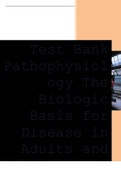Nursing nsg 5003 Study guides, Class notes & Summaries
Looking for the best study guides, study notes and summaries about Nursing nsg 5003? On this page you'll find 195 study documents about Nursing nsg 5003.
Page 4 out of 195 results
Sort by
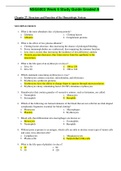
-
NSG5003 Week 6 Study Guide Graded A
- Exam (elaborations) • 15 pages • 2022
-
- $11.00
- + learn more
1. What is the most abundant class of plasma protein? a. Globulin c. Clotting factors b. Albumin d. Complement proteins 2. What is the effect of low plasma albumin? a. Clotting factors decrease, thus increasing the chance of prolonged bleeding. b. Fewer immunoglobulins are synthesized, thus impairing the immune function. c. Less iron is stored, thus increasing the incidence of iron deficiency anemia. d. Osmotic pressure decreases, thus water moves from the capillaries to the interstitiu...
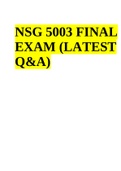
-
NSG 5003 FINAL EXAM 2021/2022 (LATEST Q&A)
- Exam (elaborations) • 20 pages • 2022
-
- $10.99
- + learn more
NSG 5003 FINAL EXAM 2021/2022 (LATEST Q&A) This is a complete and an all-inclusive guide to NSG 5003 FINAL EXAM. Which component of the cell produces hydrogen peroxide (H2O2) by using oxygen to remove hydrogen atoms from specific substrates in an oxidative reaction? Question 1 options: Lysosomes Peroxisomes Ribosomes Oxyhydrosomes Question 2 (5 points) What is a consequence of plasma membrane damage to the mitochondria? Question 2 options: Enzymatic digestion halts deoxyribonucleic a...
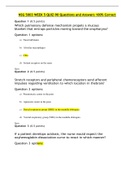
-
NSG 5003 WEEK 5 QUIZ-90 Questions and Answers 100% Correct
- Exam (elaborations) • 9 pages • 2022
-
- $11.00
- + learn more
Question 1 (0.5 points) Which pulmonary defense mechanism propels a mucous blanket that entraps particles moving toward the oropharynx? Question 1 options: a) Nasal turbinates b) Alveolar macrophages c) Cilia d) Irritant receptors on the nares Save Question 2 (0.5 points) Stretch receptors and peripheral chemoreceptors send afferent impulses regarding ventilation to which location in the brain? Question 2 options: a) Pneumotaxic center in the pons b) Apneustic center ...
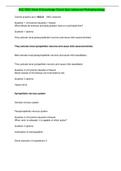
-
NSG 5003 Week 8 Knowledge Check Quiz Advanced Pathophysiology
- Exam (elaborations) • 8 pages • 2022
-
- $11.00
- + learn more
Question 1 (0.5 points) Question 1 Saved What effects do exercise and body position have on renal blood flow? Question 1 options: They activate renal parasympathetic neurons and cause mild vasoconstriction. They activate renal sympathetic neurons and cause mild vasoconstriction. Both activate renal parasympathetic neurons and cause mild vasodilation. They activate renal sympathetic neurons and cause mild vasodilation. Question 2 (0.5 points) Question 2 Saved Blood vessels of the ...
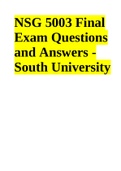
-
NSG 5003 Final Exam Questions and Answers
- Exam (elaborations) • 18 pages • 2022
-
- $10.99
- + learn more
NSG 5003 Final Exam Questions and Answers - South University. This is an inclusive guide to NSG 5003 Final Exam Questions and Answers. Which component of the cell produces hydrogen peroxide (H2O2) by using oxygen to remove hydrogen atoms from specific substrates in an oxidative reaction? Question 1 options: Lysosomes Peroxisomes Ribosomes Oxyhydrosomes Question 2 (5 points) What is a consequence of plasma membrane damage to the mitochondria? Question 2 options: Enzymatic digestion ha...
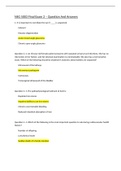
-
NSG 5003 Final Exam 2 – Question And Answers
- Exam (elaborations) • 53 pages • 2022
-
- $14.49
- + learn more
NSG 5003 Final Exam 2 – Question And Answers 1. It is important to not dilate the eye if ____ is suspected. Cataract Macular degeneration Acute closed-angle glaucoma Chronic open-angle glaucoma Question 2. 2. An 18-year-old female patient presents with repeated urinary tract infections. She has no risk factors in her history, and her physical examination is unremarkable. She also has a normal pelvic exam. Which of the following should be obtained if anatom...
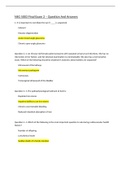
-
NSG 5003 Final Exam 2 – Question And Answers
- Exam (elaborations) • 53 pages • 2022
-
- $14.49
- + learn more
NSG 5003 Final Exam 2 – Question And Answers 1. It is important to not dilate the eye if ____ is suspected. Cataract Macular degeneration Acute closed-angle glaucoma Chronic open-angle glaucoma Question 2. 2. An 18-year-old female patient presents with repeated urinary tract infections. She has no risk factors in her history, and her physical examination is unremarkable. She also has a normal pelvic exam. Which of the following should be obtained if anatom...
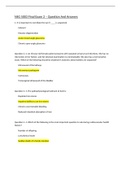
-
NSG 5003 Final Exam 2 – Question And Answers
- Exam (elaborations) • 53 pages • 2022
-
- $14.49
- + learn more
NSG 5003 Final Exam 2 – Question And Answers 1. It is important to not dilate the eye if ____ is suspected. Cataract Macular degeneration Acute closed-angle glaucoma Chronic open-angle glaucoma Question 2. 2. An 18-year-old female patient presents with repeated urinary tract infections. She has no risk factors in her history, and her physical examination is unremarkable. She also has a normal pelvic exam. Which of the following should be obtained if anatom...
Test Bank Pathophysiology The Biologic Basis for Disease
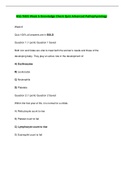
-
NSG 5003 Week 6 Knowledge Check Quiz Advanced Pathophysiology
- Exam (elaborations) • 4 pages • 2022
-
- $11.00
- + learn more
Question 1 (1 point) Question 1 Saved Both iron and folate are vital to meet both the woman’s needs and those of the developing baby. They play an active role in the development of: A) Erythrocytes B) Leukocytes C) Neutrophils D) Platelets Question 2 (1 point) Question 2 Saved Within the first year of life, it is normal for a childs: A) Reticulocyte count to rise B) Platelet count to fall C) Lymphocyte count to rise D) Eosinophil count to fall Question 3 (1 p...

Do you wonder why so many students wear nice clothes, have money to spare and enjoy tons of free time? Well, they sell on Stuvia! Imagine your study notes being downloaded a dozen times for $15 each. Every. Single. Day. Discover all about earning on Stuvia



